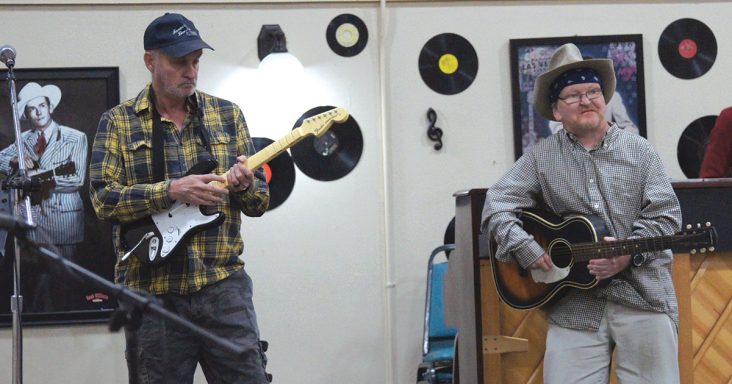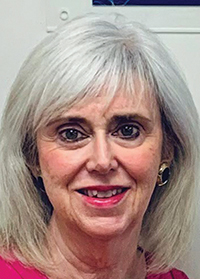New Elizabeth Richardson Center director in Fayetteville looking to revamp regional philanthropy
by August 22, 2022 8:15 am 1,516 views

The Elizabeth Richardson Center, a Fayetteville-based nonprofit, serves hundreds of children and adults throughout the region, who have been diagnosed with a developmental disability or delay.
Fayetteville-based nonprofit Elizabeth Richardson Center (ERC) recently hired Kim Aaron, a manager of nonprofits for over 25 years, as executive director. The former CEO of United Way of Northwest Arkansas has been with the ERC for almost five months.
“It feels much longer because we’ve done so much in such a short time,” Aaron said. A search firm in Kansas City, Mo., reached out to her about the position. “I thought, ‘well, that would be different.’”
After her two-hour tour of the ERC’s facilities turned into four hours, she knew it was where she was meant to be.
“I met the people we serve, and they were so friendly,” she said. “They’re all created uniquely and beautifully.”
The ERC board was looking for someone who works strategically with organizations, the programs they run and where work needs to be done.
“As soon as I walked in, things were happening that required me to dive deep, so I feel like I’ve been both high-level and grassroots,” Aaron said. “It’s a great way to learn.
“For me, as someone new to this, it’s really [about] understanding how we define what a person with a developmental delay or disability is.”
HISTORY OF HELPING
The ERC is the most extensive provider of disability services based in Northwest Arkansas and now serves about 200 children and adults annually. Founded in September 1963, the center began in the basement of Fayetteville’s First United Presbyterian Church for four students with developmental delays or disabilities. Elizabeth Richardson was the first teacher and later executive director.
“We serve people on the autism spectrum, children and adults with cerebral palsy, Down syndrome, traumatic brain injuries,” said Zarah Reed, ERC chief operations officer. Reed has been in her role for eight years with a background in business management. She transitioned from working with nursing homes. Like Aaron, she was quickly won over by the ERC.
“I came for an interview for the job and had never seen anything like it. I fell in love,” she recalled.
ERC staffs three child development centers in Fayetteville, Siloam Springs and Huntsville, along with three residential homes for adults in Springdale and three adult day facilities. The clients’ ages range from 6 weeks old to their 70s.
“We’re the only provider in Northwest Arkansas with intermediate care facilities for adults,” Reed said.
The ERC supports clients in having a job.
“We work with different companies where we do job carving,” she said. “We focus on specific tasks they need done and match a skill set that our individuals have to that.” The ERC has clients working at Sam’s Club, Village Inn, various car washes and a movie theater.
Michael and Sharon Wilcox have a 32-year-old son, Adam, who has been with the ERC for five years. “We noticed when we visited that they weren’t condescending. It didn’t feel like a patient staff. It felt like a community,” Sharon said.
“He moved into their group home in 2017. He is now in one of the houses with two roommates. They’re in a regular neighborhood and have a backyard. It’s been a good experience, and we couldn’t do all that.”

The ERC helped Adam have a steady transition when separating from his parents.
“All young people have to separate from parents no matter the scenario,” Sharon said. “The ERC made it smooth because the staff is empathetic with their clients.”
Adam has been working at the AMC theater in Fayetteville for three years.
“He works 20 hours a week. They really love Adam there,” Michael said. “He’s got quite the personality and is an outgoing young man. I’m sure his presence helps how they are received. I wish that more businesses could realize it and be more accommodating. I just think they don’t know.”
The ERC’s goals are to rework facilities, consolidate and be more efficient in providing services.
“We’re also building a vision around how we can do more social enterprise,” Aaron said. She referenced a project to resurrect a greenhouse to grow vegetables that clients could sell in a farm stand.
“Our long-term vision is things that will involve our clients hands-on in different types of educational experiences with a social enterprise,” she said.
The ERC works for its clients to have normalizing experiences.
“If you have a hobby or interest and want to teach a class to our adults, anything from yoga, pottery, dental hygiene, resume building or interviewing. It’s a big thing that we need help with,” Reed said.
ERC also has a year-round Special Olympics for clients 8 years or older. The fall softball league is preparing to start its season from August through October.
“We need anyone who can help practice and play on the team,” Reed said.
Other leisure activities include dances, bowling, talent shows and camping trips.
“There’s hardly anything the ERC hasn’t thought to do,” Sharon said. “It’s keeping everyone busy, keeping everyone having a purpose. Getting all those normalizing experiences that we all need.”
The ERC continues to help clients who are living independently, like Adam.
“They need us to drive them to work, to help them manage the challenges we all have when we adjust to a new job,” Aaron said. “We coach from the sidelines. We’re still engaged, even though we’re facilitating their independence.”
FUNDING NEEDED
The ERC has 11 vans for transportation that travel about 80,000 miles a year. It’s been recently mandated that cameras, GPS trackers and safety alarm equipment are required for the vans.
“That’s a government requirement, but they’re not providing any funds to do it,” Aaron said.
Medicaid is ERC’s primary source of income. The budget projects revenue at $11.8 million for 2022, with the government funds making up $11.2 million of that, or about 95%.
“It doesn’t provide a lot of extra revenue for our hard costs,” Aaron said. “There’s not much left over for maintenance on the homes, the buildings, and supplies we need. We need everything you’d need to send a kid to school for our children’s programs and everything you’d need for an adult, up to the nursing home type of care.”
The ERC provides food, toys, sensory items, furniture for the facilities and hygiene products.
Aaron plans to establish a new $100,000 client crisis fund for those coming to the ERC in need of services but denied by the third parties the state uses to determine eligibility. Donations would be used to fund it.
“We’ve had one of these third parties decline individuals we’ve been serving for over a year,” Aaron said. “They were initially approved for services. Then almost on a whim, the third party determines they can no longer have services.”
The fund would allow the ERC to serve the client until they can come up with another option.
“Everyone has probably had their health insurance decline something but imagine something like that happening for a person with the comprehension of, at best, a 12-year-old,” she said. “We feel like we’re constantly chasing ourselves trying to come up with the money. “We’ve been fortunate to have reserves, but we’re burning through those just to maintain our work. We have a moral responsibility to help, but no funding to do so.”
“We’ve found we have a lower profile in the community. Fewer people think about donating to us, so we’re really trying to rebuild philanthropy and start to talk to the community to say, ‘We need your help.’”
